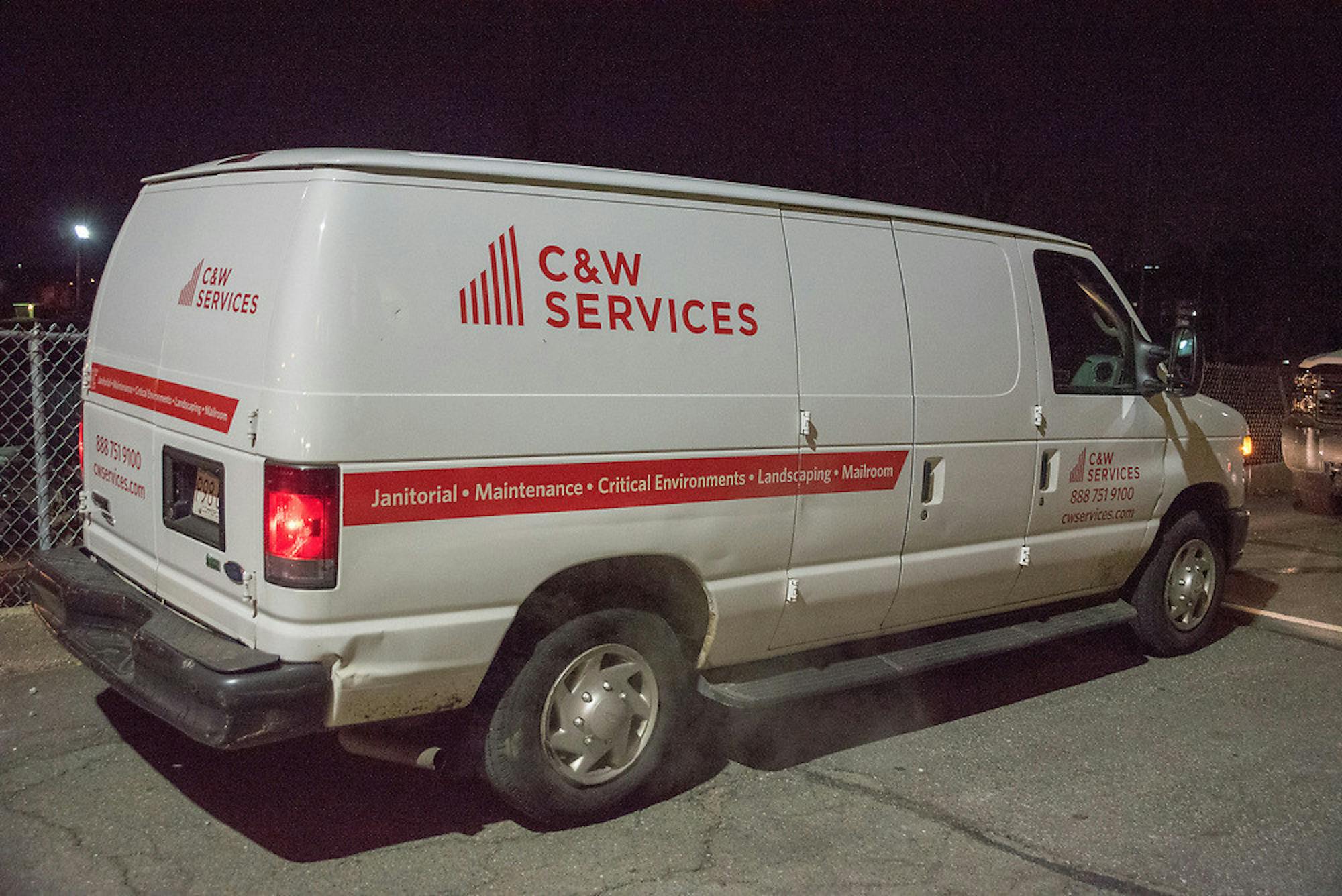When Luz Rosello came to the Medford campus as a part-time janitor in November 2017, she was expecting more job security and opportunity. Previously a temporary, on-call janitor on Tufts' Boston campus, Rosello finally had a permanent job. In February 2018, she was greeted with another bit of happy news: She was pregnant. Yet, telling her employer that she was bringing life into the world seemed to bring Rosello nothing but consequences.
Knowing about the pregnancy, C&W Services — the company with which Tufts contracts its custodial labor — increased Rosello’s workload and was slow to respond to her complaints. Rosello continued working until nine days before her due date. Then, C&W Services Account Manager Shawn Amaral insisted she return to her job only two weeks after deliveringor else lose her job.
While Rosello was ultimately able to negotiate a longer period of leave, when she returned, her job was less consistent, and she was eventually fired in February of this year. Amaral's stated reason for the firing was that the work of cleaning the campus had simply decreased, yet Rosello and other janitors say this is not true. Perhaps proving their point, Tufts has relied on three on-call janitors to fill the need left by Rosello’s absence.
Despite negotiations on the part of the union and organizing by students in Tufts Labor Coalition (TLC) — including a petition to rehire Rosello with more than 300 signatures — Rosello still does not have her job back, and she has not been able to find one that is equally well-paying to her position at Tufts. While Rosello said she has been offered to work 12 hours a week, these hours are only at times when she has child-care responsibilities, which are significant as a single mother of three children. Prior to her departure, she worked 20 hours weekly.
“I had never thought of the possibility,” Rosello said, when asked if she could ever predict this outcome from telling her employer about her pregnancy. “I was planning on having my baby and then coming back to work.”
Protection against discrimination on the basis of pregnancy is mentioned explicitly both in the janitors’ contract with C&W Services, ratified in 2016, and in federal law, in the form of the Pregnancy Discrimination Act of 1978. Moreover, on April 1, 2018, the Pregnant Workers Fairness Act became effective in Massachusetts, which states that “employers may not treat employees or job applicants less favorably than other employees based on pregnancy or pregnancy-related conditions and have an obligation to accommodate pregnant workers.”
Logan Place, an attorney at Sherman Dunn, P.C., a D.C.-based labor and employment law firm, said that Rosello could have a valid and potentially successful claim to pregnancy discrimination in court.
“[The employer] is reducing hours just after she came back from maternity leave and after there was a dispute over how long she would take and then redistributing those hours among other employees,” Place said. “It sounds like a pregnancy discrimination claim.”
Amaral did not reply to the Daily’s request for comment.
“It would be a breach of confidence to discuss any employee’s terms of employment publicly,” Christine Wickes, vice president of marketing at C&W Services, told the Daily in an email, in response to the Daily reaching out to Amaral.
Director of Campus Services Gary Hill, who serves as a liaison between the university and C&W Services, also did not reply to the Daily’s request for comment. Executive Director of Public Relations Patrick Collins told the Daily in an email that Tufts is not responsible for the employment policies of C&W Services.
“We appreciate all that C&W employees do to create an environment that is conducive to learning and working for our students, faculty and staff,” Collins said. “However, C&W staff are not employees of Tufts. The University does not hire, fire, or supervise C&W employees, and Tufts employment policies do not apply to C&W workers. As a result, Tufts plays no role in the decision to terminate C&W employees and has no authority to review or change C&W decisions.”
Unsafe working conditions
Prior to her pregnancy, Rosello said her job was to clean five houses on the Medford campus. Around the time she told her supervisors she was pregnant, this number increased to seven. Given that she was a part-time worker, this change meant Rosello was cleaning seven houses in four hours, according to a janitor who spoke to the Daily anonymously over concerns about job security.
“I told them I was pregnant, and they said nothing,” Rosello said. “They said it wasn’t their problem.”
One of the houses Rosello was assigned to clean had a cat. Cat feces are known to carry a toxin that is particularly harmful to pregnant women and their unborn children, according to the Centers for Disease Control. Yet Rosello was still tasked with taking out the trash with the cat’s litter for two months of her pregnancy.
Rosello complained about her workload and conditions to Amaral and another supervisor. However, Rosello said her complaint wasn’t met with a response, but worse treatment. She said her work was increasingly monitored and her supervisors were increasingly suspicious.
“When [Rosello] was arriving, the supervisor was already there to ... [watch how much] time she was going to take,” the anonymous janitor said. “She had to walk a lot, because the houses are far apart from one another and ... the supervisor was always very watchful.”
Eventually, Rosello’s supervisors addressed her complaints, but only partially. They reduced her workload from seven houses back to five, Rosello said. And while another person was tasked with throwing out the cat litter, it was still Rosello’s job to clean the house that was home to the cat.
It took three to four weeksfor Rosello’s complaints to be addressed, she said. According to the janitors’ contract, employers must respond to complaints within 10 days.
“Four weeks seems like a long time to address a reasonable accommodation when they’re pregnant, Place, the labor lawyer, said. “It takes four weeks. It just seems pretty immoral and [unethical] to [make] someone, who asked not to do something like that, to keep doing it.”
Rosello would work under these conditions until Oct. 10, 2018, nine days before her official due date.
Coming back to work
Rosello gave birth on Oct. 21, 2018. She was told that if she did not return to work by Nov. 8, 2018, Amaral would fire her.
Ultimately, Rosello said she was allowed to take a longer leave after providing documentation from her doctor.
Place noted that the Family and Medical Leave Act, which normally allows employees to take 12 weeks of maternity leave, does not cover part-timers like Rosello. He noted employers are aware of this loophole and for this reason, may seek to hire part-time employees.
“In general, you see a lot of bad-acting employers instead of hiring three full-timers, hiring six part-time employees," Place said.
Upon returning to work on Jan. 8, Rosello said the treatment she received was markedly different.
“They were treating me differently when I came back,” Rosello said. “Shawn [Amaral] would ignore me even if I said, ‘Good morning.’I would try to to finish the jobs or get close to done. They were assigning me eight hours’ worth of work to complete in four.”
Not only was Rosello’s workload increasingly arduous, the tasks she was given to complete each day were less consistent and clear. Before taking leave, she had a set number of buildings to clean, and afterwards, her duties were more variable. Yet, she was worried complaining would backfire.
“I didn't complain," Rosello said. “Why? Because I knew they wanted to fire me.”
Dismissal from job
Feb. 18 was Rosello’s last day at Tufts. Five days earlier, she had received a letter firing her, saying that her job was no longer necessary for the cleaning of the university.
“The reason was that I was given, which wasn’t true, was that the university had cut hours and that the person with the least seniority was me,” Rosello said.
While Rosello was the part-timer with the least seniority, the anonymous janitor said, she was a permanent worker. Now, three on-call janitors are completing the tasks Rosello once did, making the claim that there was simply less work dubious. The janitor emphasized that more janitors are necessary to keep the campus clean.
“I had never seen the campus as dirty as it is right now because there’s no one to do the jobs,” the janitor said. “And they’re still laying people off because what the company wants to do is save hours, pocket the money — all that they can."
Furthermore, the on-call workers are supposed to be used on an as-needed basis, and their jobs are temporary, making their status below that of Rosello. While the janitor and Rosello said that Amaral plans to turn Rosello’s hours into a full-time position, Place noted that firing employees is not the only way to create full-time work.
“If they’re going to turn it into a full-time position, that’s good,” Place said. “[There are] better ways to do that than just firing staff. There are ways you can slowly transition rather than just firing someone or significantly reducing their hours. You can wait [until] people leave. You can do it gradually.”
The union has been negotiating with Amaral and other C&W administrators for Rosello to get her job back, but talks have only resulted in dead ends, the anonymous janitors said. So far, the only offer on the table is Rosello returning to working 12 hours a week, instead of her original 20, and only at times where she is unavailable due to child care.
Place said that if the employer only offers hours at a time when the employee cannot work, it would be possible to prove that this was a tactic to push Rosello out of the company.
In addition to the efforts of the union and Rosello herself, students in TLC circulated a petition on April 23 for Rosello to get her full job back. TLC has also tried more direct measures, visiting the office of Tufts facilities on 520 Boston Ave. three times between May 2 and May 6, according to TLC member and rising sophomore Yashi Thakurani.
Thakurani noted that when TLC members spoke to Amaral in person on May 3, he repeatedly declined to comment. On May 6, the students were able to talk to Hill, who told them to email the human resources department of C&W Services, which the group has since done, Thakurani said.
TLC member Jesse Ryan, a rising junior, said that TLC has sent over 30 emails to Amaral, Hill and the human resources department of C&W Services. Ryan said they have received no response to any of these emails, aside from notes that Tufts is not responsible for C&W employees and further advice to contact C&W human resources.
Thakurani said that TLC will persist in fighting for Rosello’s job.
“We students love the workers and care really deeply about them and won’t stop fighting until they get justice,” Thakurani said. “I know as students we have power. That was really clearly demonstrated through the dining campaign.”
In the meantime, Rosello said she was able to find a new job, but one that only allows her to work 14 hours a week, where at Tufts she worked 20 hours at a higher wage. She said she would like to get her old job at Tufts back.
“It’s difficult once you have a set job for a while and then having to grab whatever you can get. I had a new baby and no job; it was difficult,” Rosello said.
The anonymous janitor emphasized the struggle of supporting three children as a single mother on a reduced income.
“Two things worried me: Her health worried me and her kids worried me,” the janitor said. “She still needs to buy diapers, milk, food and to maintain herself.”
For now, Rosello emphasized the frustration of being fired from a job which she had prided herself in.
“I cried a lot, and I became enraged,” she said, referring to her reaction upon dismissal. “I really didn’t know why [Amaral] left me without a job as I had done everything they wanted me to.”
Daniel Montoya contributed to the reporting of this article. Daniel Montoya and Isabella Montoya translated the janitors’ words from Spanish to English.
Tufts janitor fired after taking pregnancy leave

A C&W Services van, parked outside Curtis Hall, is pictured on Dec. 9, 2018.





